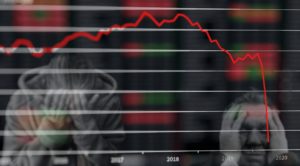Why is trading with shares such an exciting and lucrative field? In the following, we have therefore compiled the 10 most important reasons why shares are perfect for trading and what opportunities and risks share trading has overall.
Reason No. 1: The large stock selection offers many opportunities
Around 43,000 companies are listed on the stock exchange worldwide. Between 1980 and 2020, the number of companies listed on the stock exchange alone has increased by around 150 percent. This, of course, offers you as a potential trader an unprecedented amount of opportunities to trade this asset class. You can also choose from various sectors such as consumer goods, technology, green energy, pharmaceuticals and many other economic sectors from which you can select shares for trading.
Reason #2: The low cost of stock trading
Compared to other types of trading, short-term stock trading is extremely cheap. You basically don't need anything more than your own trading account (which is often free) as well as some initial capital for trading. Here are a few typical costs that may be incurred when trading stocks:
- Spread costs (often a few "pips" - meaning the fourth digit after the decimal point)
- Costs for trade commissions (this is a fixed trading fee, which is on average about 10 Euro per lot - 1 lot corresponds to a position size of 100,000 Euro (10))
With many new brokers, you can now also trade shares free of charge and only pay the broker a monthly flat fee of 2 to 10 euros on average. Stock trading without fees is also possible with some new brokers. It is worth comparing here!
Reason No. 3: Transparent information and reports
Hardly any other asset class offers access to such varied and up-to-date news as shares. After all, companies listed on the stock exchange must regularly inform their shareholders of financial reports, management changes or other strategic news. In addition: quarterly reports, annual reports or balance sheets can be accessed and researched by you as a potential trader at any time on portals such as the Bundesanzeiger (Federal Gazette). News portals such as Finanzen, on the other hand, offer fast and uncomplicated access to all news from the world of finance.
Reason No. 4: Shares regularly pay dividends
As a trader, you can of course also benefit from the advantages of the dividends that many stock corporations pay out to their shareholders. For DAX shares alone, the average current dividend yield is around 2.90 percent! Dividends thus mark a lucrative additional income for you in trading in the form of regular, passive earnings, which are available to you in addition to your price gains. Asset classes such as commodities or cryptocurrencies, which can also be traded, do not offer any such payouts.
Reason #5: Leveraged trading possible
With many brokers you can use a maximum leverage of up to 1:5 when trading stocks. This means that you only have to contribute one five-hundredth of your own capital per trade - you borrow the remaining capital from your broker for the trade. The borrowed capital provided by the broker for this purpose is also referred to as "leverage". In order to use the leverage for yourself, you must deposit your "margin" (or "safety reserve") and pay a small interest fee. As soon as the trade is liquidated, the broker gets his capital back and you get your potential (to the invested equity) leveraged profit. Note, however, that this can also result in large losses at any time!
Reason #6: Large number of order commands can be used
In contrast to regular order types, there are plenty of useful command types available to you in stock trading, which you can use to automate your trading to a large extent:
- "Stop Loss" (here, the trading software automatically triggers a sale as soon as the share price falls below a certain [loss] threshold).
- "Take-Profit" (here, the trading software automatically triggers a sale as soon as the share price rises above a certain [profit] value).
- "Traling-Stop"(here the trading software automatically pulls the above "stop loss" along with the price, insofar as it moves into the profit zone).
- "One-Cancels-Other-Order"(here, the trading software first triggers a combination order and then deletes the respective superfluous (because loss-prone) order).
Learn more about the topic here, in our detailed article about the different order types.
In addition to the order types mentioned above, there are a large number of order add-ons that you can use to limit the time of your orders:
- "Good-Till-Date" (buy or sell order is triggered at a specific time).
- "Good-After-Date/Time" (your order will be triggered after a certain time at the earliest).
- "Conditional Orders"(here you first define individual conditions so that the order is executed at all).
Reason No. 7: Shares are volatile and react strongly to news
Shares are a comparatively volatile - i.e.: strongly fluctuating - asset class. Price fluctuations of up to 60 percent are not uncommon in bull or bear markets. Are you wondering whether this is good for trading? Absolutely! Because in order to be able to trade successfully at all, you need "movement" on the markets. If the share prices are rising, you can earn money via "long orders", or if they are sinking, "short orders" are the means of your choice. If there are no price fluctuations at all (so-called "sideways markets"), the market often does not offer you good trading opportunities.
Reason #8: Stock trading is also suitable for working people
Depending on which markets you choose, so you can perform stock trading especially as a professional in the part-time acquisition. The trading hours of the Frankfurt Stock Exchange, for example, are weekdays between 8:00 and 22:00. The London and New York stock exchanges, which are also of interest to you as a potential trader, open only slightly to significantly later due to the time difference and their location west of Germany, so that these can be traded in many places after work - for example London from 9:00 to 17:30 or New York from 15:30 to 22:00 MET.
Reason No. 9: Earn money even when prices fall
In contrast to regular share purchases, where you place shares in your individual securities account for long-term investment, share trading allows you to earn money even if prices fall. And you can do this with the help of "short orders". This is a so-called "short sale", i.e. a sale of a share that you do not yet own at the time of trading.
To do this, you borrow the relevant share from the broker and must buy it from the broker by the settlement date at the latest in order to return the borrowed shares to the broker. Ideally, the share price will fall by the settlement date, so that the return of the shares will cost you less than the shares initially sold short.
Reason No. 10: Flexible trading at any time [without time horizon].
In contrast to other financial products such as CFDs, trading with shares is comparatively uncomplicated. If you trade here only with equity, for example, no overnight or weekend fees are due. You can also trade your shares at any time - within the advertised exchange trading hours. Thus, stock trading is extremely flexible and offers you a wealth of participation opportunities, even part-time.
What is the best way to start trading stocks?
Stock trading sounds interesting to you and you would like to delve deeper into it, or gain your own initial experience with it? Then we recommend the following procedure to get started with stock trading:
- first open your own trading account with a broker of your choice
- then gain initial experience via an attached demo account [many brokers offer such a demo account free of charge].
- use webinars, trainings or books on the subject of trading
- establish your individual trading strategy
Use the demo account to practice the basic stock trading techniques or to test new trading strategies. In addition, use webinars, training courses or books that deal with the topic of stock trading to build up your knowledge. Then establish your individual trading strategy step by step, which also includes a suitable risk management. Then work your way into the subject bit by bit and start trading stocks via your real money account first.
FAQs on the topic of stock trading
- What are the advantages of stock trading?
Answer: You can trade flexibly at any time. Furthermore, you can use [leverage] and thus generate high profits even with a small capital investment. Stock trading is also often associated with very low costs and fees.
- What is the risk of stock trading?
Answer: Stock trading is highly speculative, which is why you should only speculate with money that you could easily afford to lose in the worst case. In addition: Make sure that you do not have a margin call obligation with your broker for leveraged capital. Here, in the case of a leveraged losing trade, you would not only have to accept the loss of your own capital, but also reimburse the broker for the leverage amount.
- What do I need for stock trading anyway?
Answer: You basically need nothing more than your own trading account, the certain starting capital (according to the minimum deposit requirement of the broker) and a bank account that serves as a reference account for your trading account.




